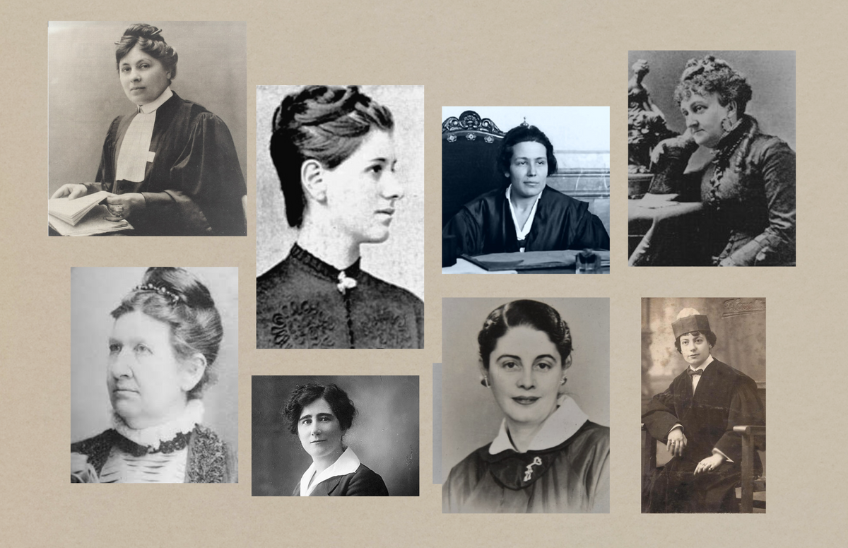Pioneers of the Law
Some of the women who broke new ground in the practice of law and in the defense of their rights

08 | 03 | 2023
"If the law is a tool at the service of the best social coexistence and society is composed of women and men, the female contribution is essential to achieve a regulation that contemplates all perspectives, and therefore, benefits society as a whole. In other words, if women and men are the recipients of legal norms, it does not seem reasonable to exclude half of humanity from the task of legislating and intervening in the legal sphere". Mari Cruz Díaz de Terán, professor at School of Law, writes in her book Women and Law. Pioneers in the USA and Spain (Eunsa, 2021)
Today, March 8, International Women's Day, we review the lives of some of the women that Professor Díaz de Terán quotation in her book and who were pioneers in the defense of women's rights and their access to the legal profession. We also mention other women who paved the way in Latin America and other European countries.
We go back to the end of the 19th century. In the United States, there is the case of Myra Colby Bradwell, who was denied licence to practice because she was married. After years of fighting for rights and equality, she was allowed to become a barrister and obtained licence to practice before the supreme court in 1890.
Ada H Kepler was the first woman in that country to be accredited at Degree Law. She graduated from Union College of Law in Chicago. And Charlotte E. Ray graduated from the District of Columbia, the first African American to do so.
Belva Ann Lockwood applied to Admissions Office at Georgetown, Howard and Columbian Law School, all at Columbia. She was rejected at all of them and was finally admitted to the Universtiy Law School, although later the University was unwilling to give her diploma as she was a woman until she wrote a letter to President Ulysses S Grant.
In Spain, although since 1910 women were able to access the University on an equal footing with men, their arrival in the legal sphere was delayed, writes Professor Díaz de Terán. The main social reason was that the presence of women in the legal sphere implied a presence in the public sphere that was difficult to fit with the canons of the time. The presence of women in the legal sphere, given its main character of public activity, was understood, according to the tradition and context of the time, as "hardly compatible with decorum and honesty".
The first woman to obtain a law degree in Spain was María Ascensión Chirivella, who was admitted to the Bar in Valencia in 1922: "Women are not inferior to men, nor superior to them, they are absolutely different. Her sensitivity is different and her talent is different, just as her function in life is different. Women's activity and talent are complementary to men's activity and talent. All that is absurd about our civilization, is born from the fact that it is made with half of the human, it has no feminine spirit," he said in his speech in the auditorium of the Literary University of Valencia, in December 1935.
high school Victoria Kent (1891-1987) was the second Spanish woman to be admitted to practice law after Ascensión Chirivella and the first to be admitted to the Bar Association of Madrid, in 1925. She was the first in the world to practice as a lawyer before a military court.
Clara Campoamor (1888-1972), who graduated in 1924, at the age of 36 became one of the few Spanish female lawyers of the time. In 1925 she joined the Madrid Bar Association high school , after Victoria Kent, and was the first lawyer to defend a case before the Supreme Court. Clara Campoamor was one of the main promoters of women's suffrage in Spain.
Breaking ground in Latin America and Europe
In Latin America, Ella Dunbar Temple Aguliar, from Peru, was the first woman to occupy a university Chair in that country and the first in the board Directive of the high school of Lawyers of Lima. And Fanny León Cordero, from Ecuador, became in 1947, the first female judge in the history of that country. She occupied the position for 31 years.
In Europe, the names of Sarmiza Bilcescu (1867-1935) from Romania, known for being the first woman in Europe to graduate in Law from the University of Paris and the first in the world to obtain a doctorate.
And in France, in 1901, Jeanne Chauvin became the first woman lawyer to act as such before the French courts. This pioneer fought all her life to facilitate women's access to university and the legal profession. In Italy, the disbarment of Lidia Pöet led to a movement to allow women to practice law and hold public office in Italy.




